
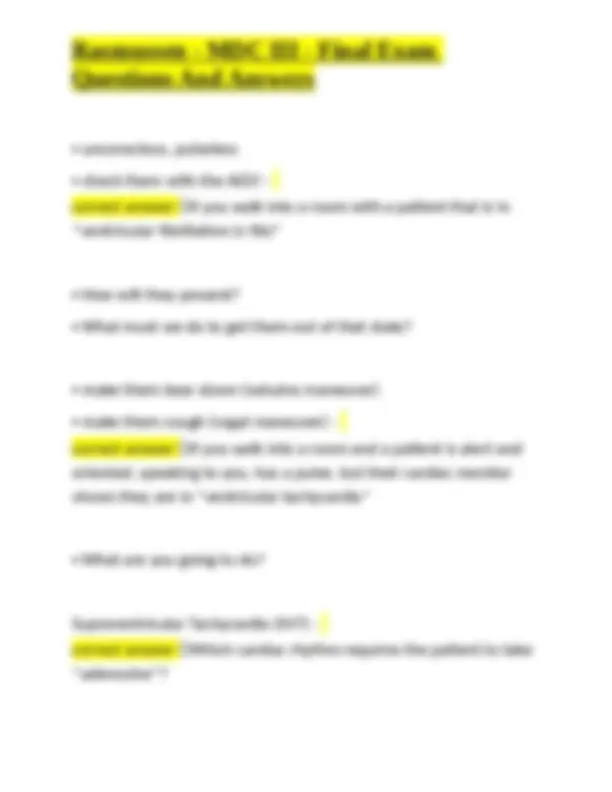
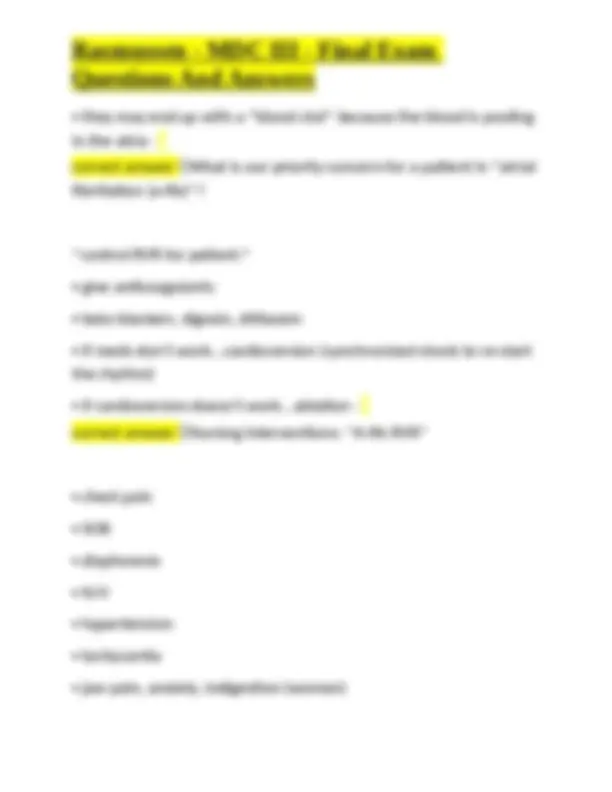
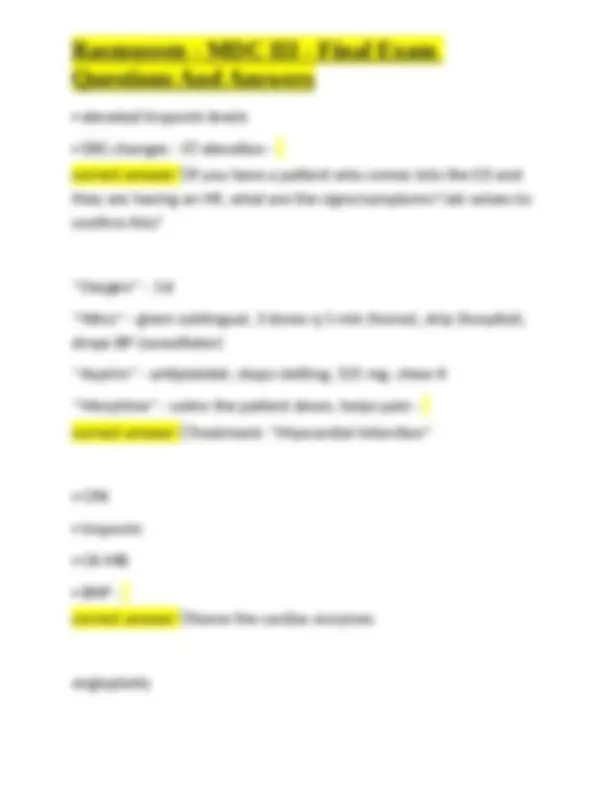
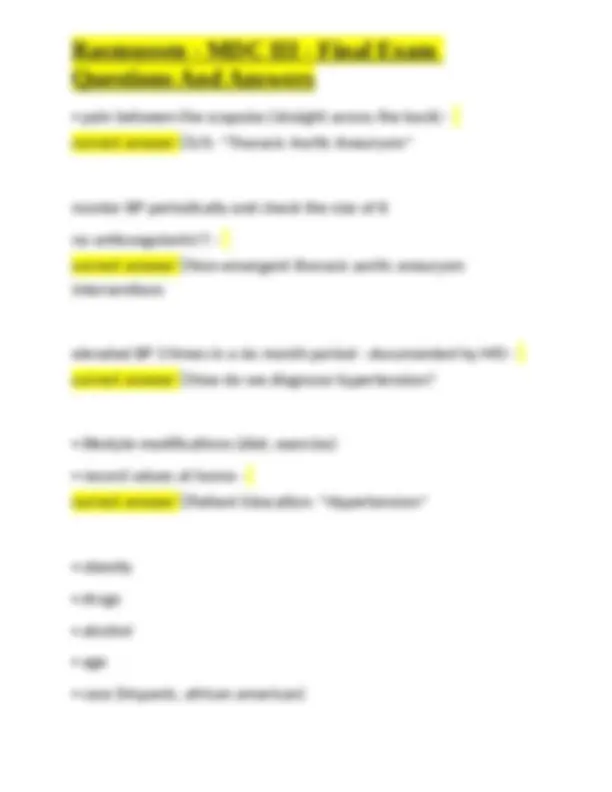
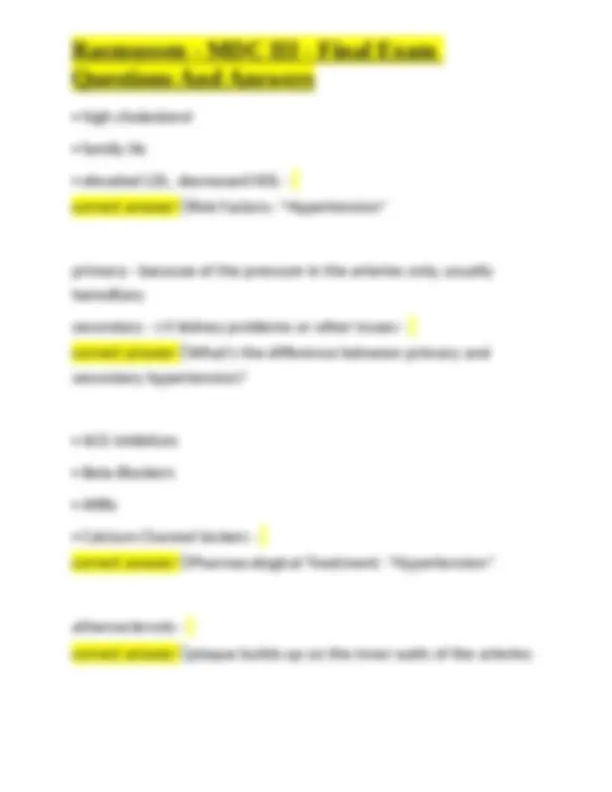
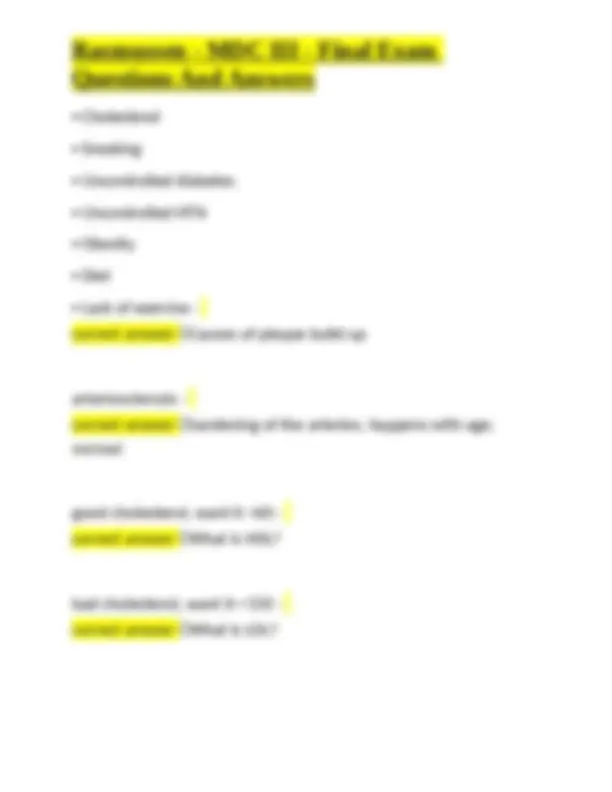
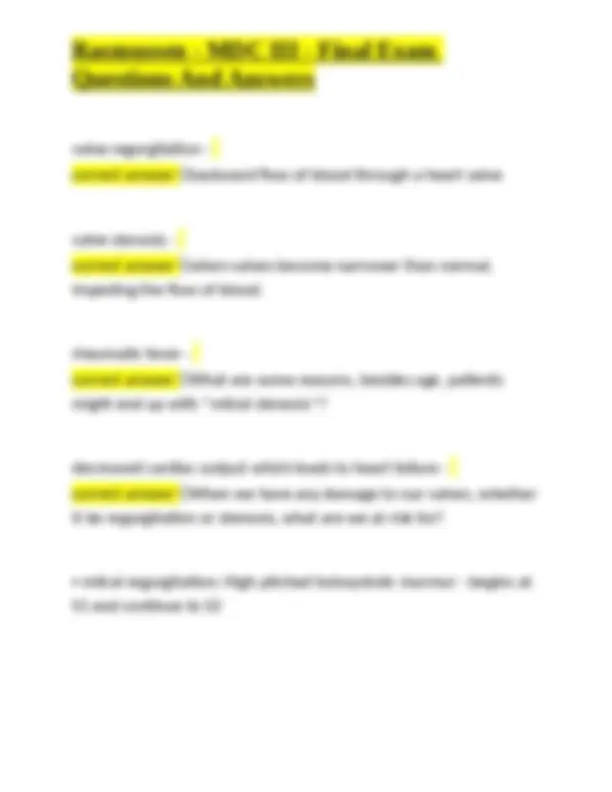
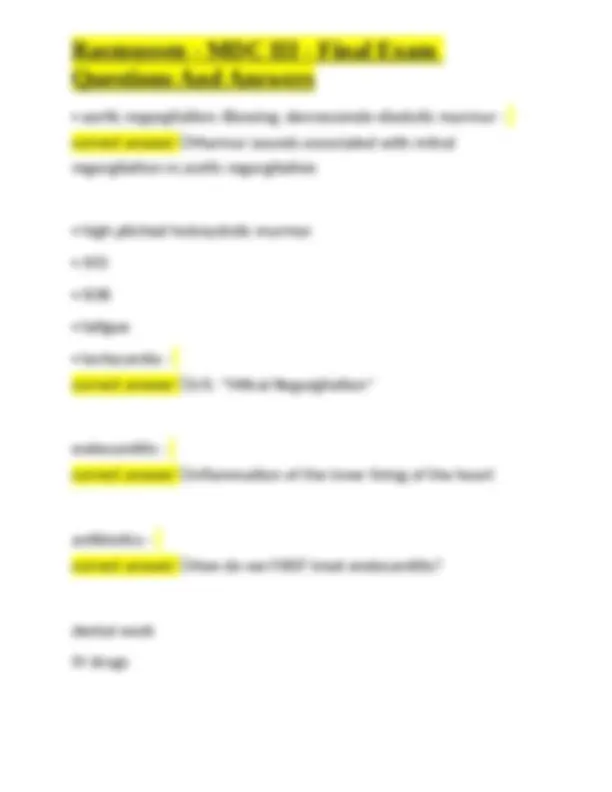
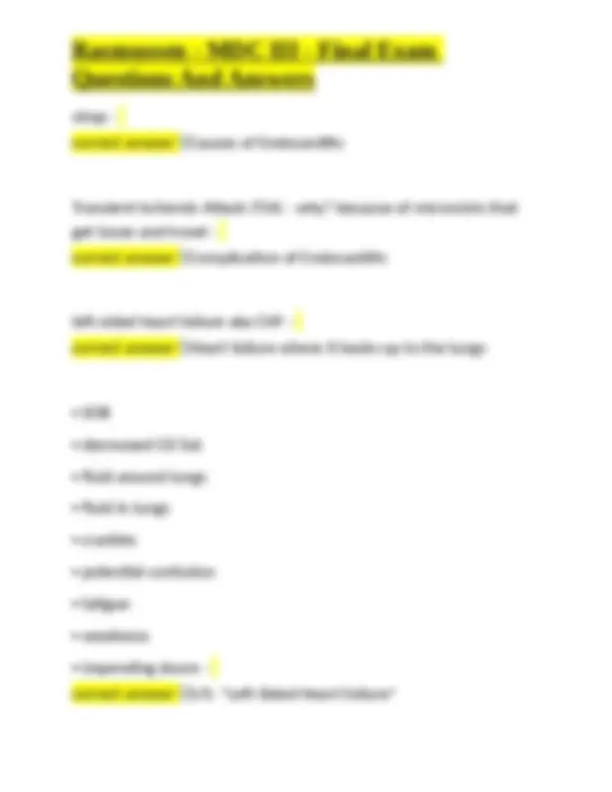
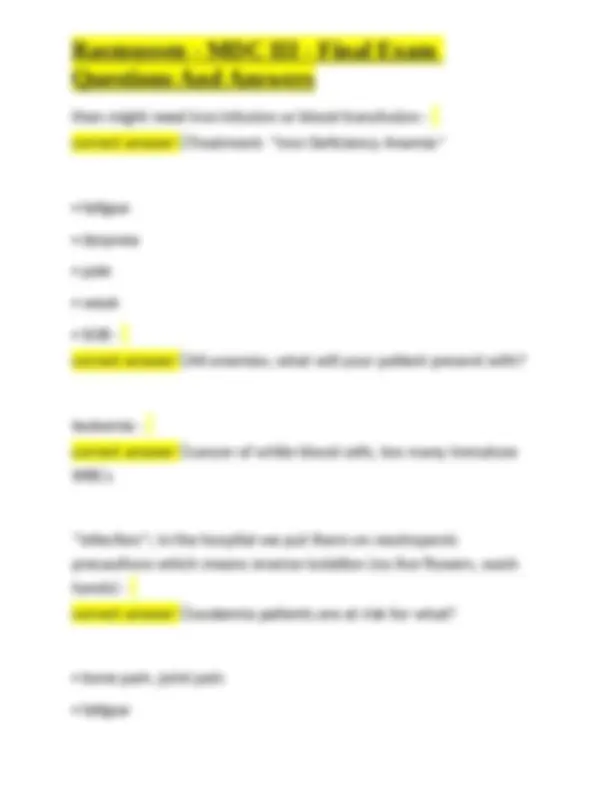
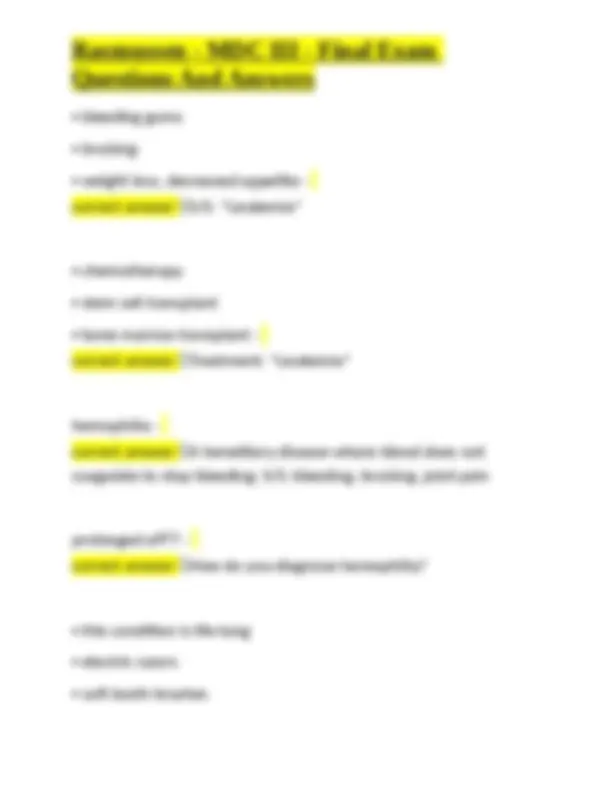
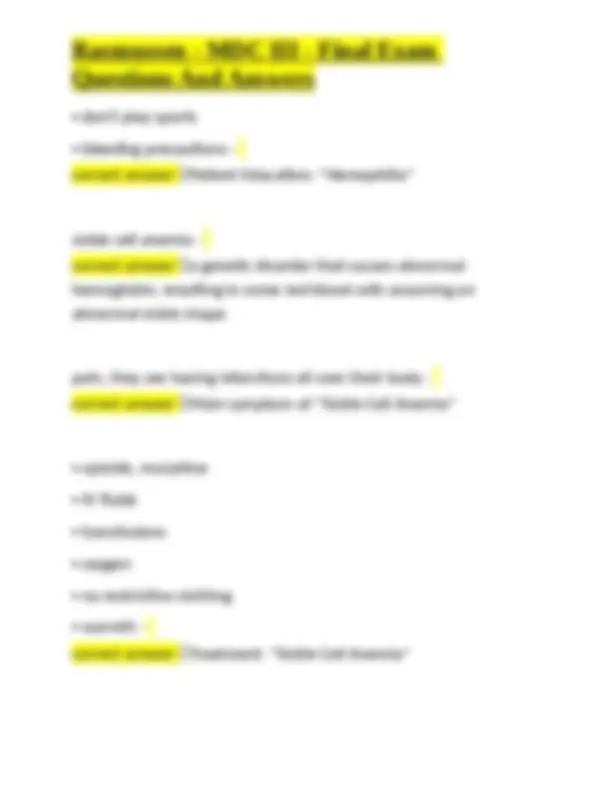
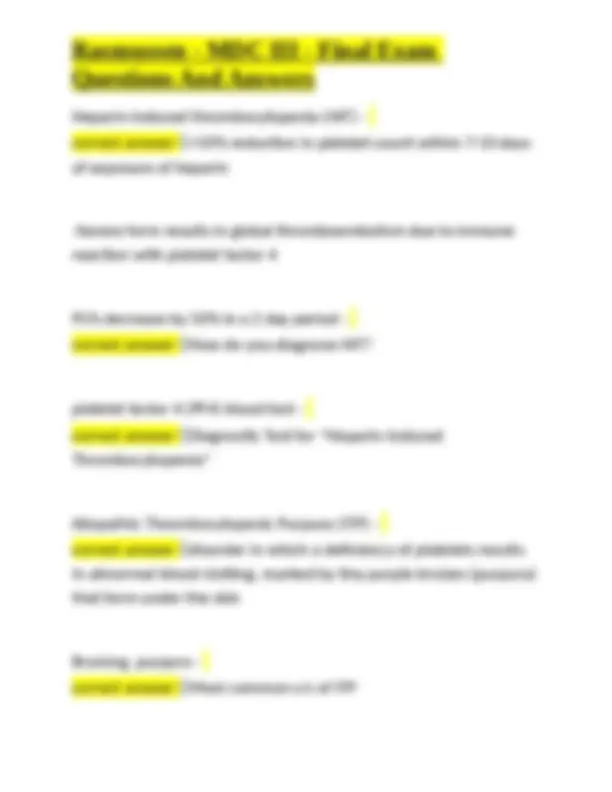
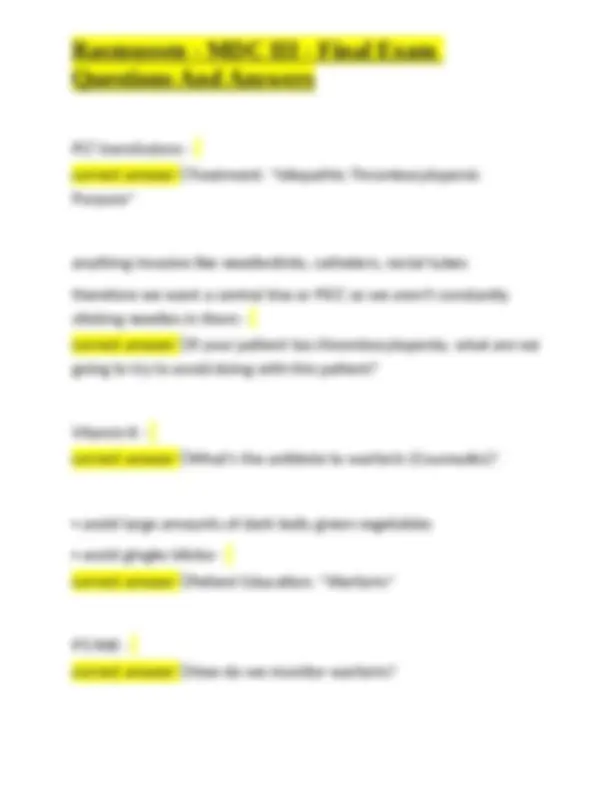
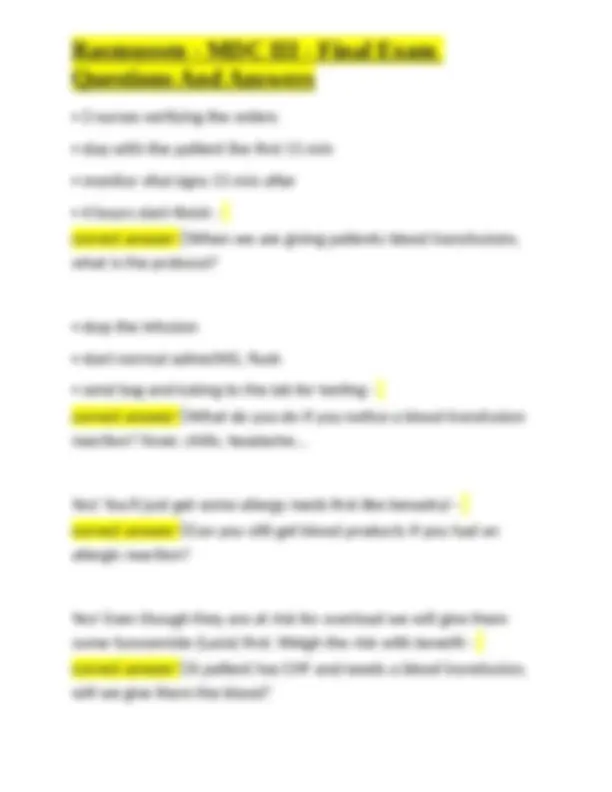
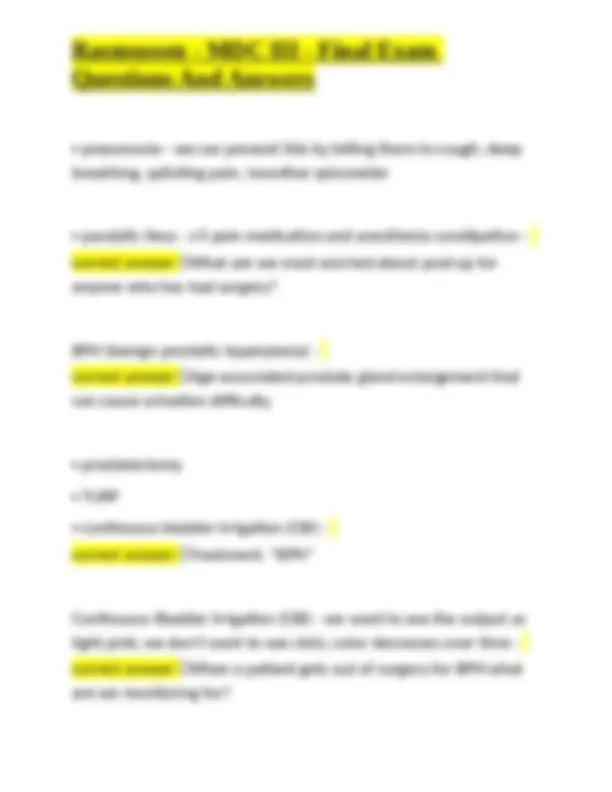
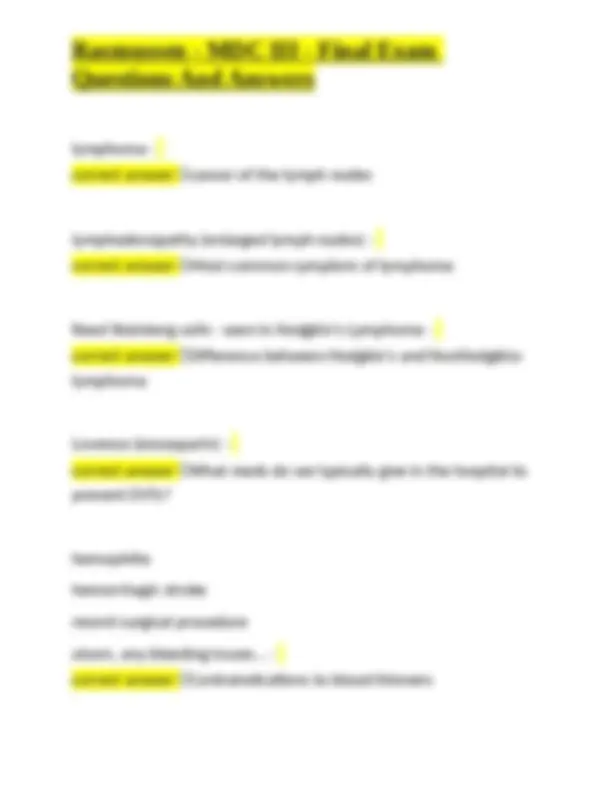
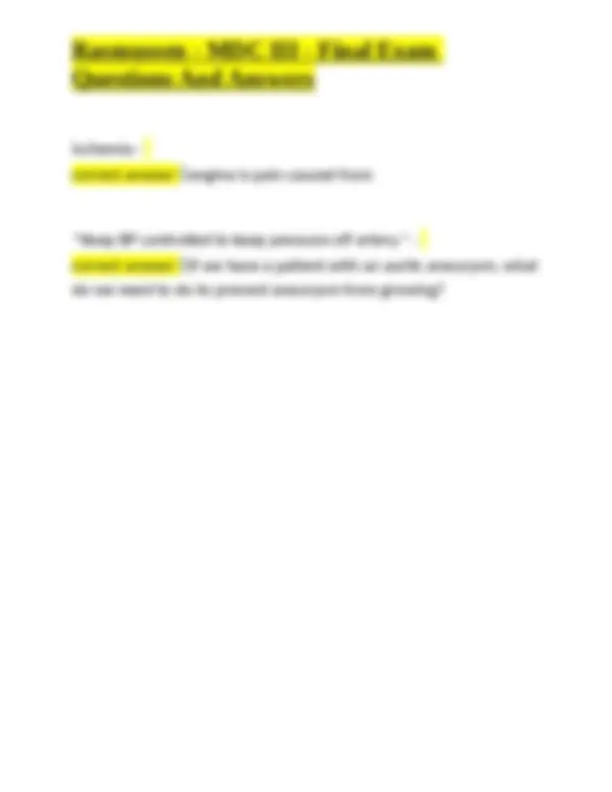


Study with the several resources on Docsity

Earn points by helping other students or get them with a premium plan


Prepare for your exams
Study with the several resources on Docsity

Earn points to download
Earn points by helping other students or get them with a premium plan
Community
Ask the community for help and clear up your study doubts
Discover the best universities in your country according to Docsity users
Free resources
Download our free guides on studying techniques, anxiety management strategies, and thesis advice from Docsity tutors
Rasmussen - MDC III - Final Exam Questions And Answers
Typology: Exams
1 / 26

This page cannot be seen from the preview
Don't miss anything!



















respiratory alkalosis - correct answer ✅high pH, low CO pH: 7.35-7.45 acidic-basic HCO3: 21-28 acidic-basic CO2: 45-35 acidic-basic metabolic acidosis - correct answer ✅low pH, low HCO pH: 7.35-7.45 acidic-basic HCO3: 21-28 acidic-basic CO2: 45-35 acidic-basic respiratory acidosis - correct answer ✅low pH, high CO pH: 7.35-7.45 acidic-basic HCO3: 21-28 acidic-basic
CO2: 45-35 acidic-basic metabolic alkalosis - correct answer ✅high pH, high HCO pH: 7.35-7.45 acidic-basic HCO3: 21-28 acidic-basic CO2: 45-35 acidic-basic ▪ change in condition make take priority over ABCs (ex: post op bleeding is priority over an O2 Sat% of 90%) ▪ pick the patient that is going to die first - correct answer ✅Priority questions...something to consider CPR, press the code button - correct answer ✅You walk into your patient's room and they don't have a pulse, what are you going to do? bag resuscitation, press the code button - correct answer ✅You walk into your patient's room and they are not breathing but have a pulse, what are you going to do?
▪ they may end up with a blood clot because the blood is pooling in the atria - correct answer ✅What is our priority concern for a patient in atrial fibrillation (a-fib)? control RVR for patient: ▪ give anticoagulants ▪ beta blockers, digoxin, diltiazem ▪ if meds don't work...cardioversion (synchronized shock to re-start the rhythm) ▪ if cardioversion doesn't work...ablation - correct answer ✅Nursing Interventions: A-fib RVR ▪ chest pain ▪ SOB ▪ diaphoresis ▪ N/V ▪ hypertension ▪ tachycardia ▪ jaw pain, anxiety, indigestion (women)
▪ elevated troponin levels ▪ EKG changes - ST elevation - correct answer ✅If you have a patient who comes into the ED and they are having an MI, what are the signs/symptoms? lab values to confirm this? Oxygen - 1st Nitro - given sublingual, 3 doses q 5 min (home), drip (hospital), drops BP (vasodilator) Aspirin - antiplatelet, stops clotting, 325 mg, chew it Morphine - calms the patient down, helps pain - correct answer ✅Treatment: Myocardial Infarction ▪ CPK ▪ troponin ▪ CK-MB ▪ BNP - correct answer ✅Name the cardiac enzymes angioplasty
pericardial effusion - correct answer ✅accumulation of fluid in the pericardial cavity Pericardialcentesis - correct answer ✅Surgical treatment: Pericardial Effusion aneurysm - correct answer ✅a localized weak spot or balloon-like enlargement of the wall of an artery Abdominal Aortic Aneurysm (AAA) - correct answer ✅Which is the most common aneurysm? ▪ epigastric pain ▪ pulsating in the abdomen - do not push on it! - correct answer ✅S/S: Abdominal Aortic Aneurysm (AAA) immediately go to the OR for surgery
▪ pain between the scapulas (straight across the back) - correct answer ✅S/S: Thoracic Aortic Aneurysm monior BP periodically and check the size of it no anticoagulants!!! - correct answer ✅Non-emergent thoracic aortic aneurysm interventions elevated BP 3 times in a six month period - documented by MD - correct answer ✅How do we diagnose hypertension? ▪ lifestyle modifications (diet, exercise) ▪ record values at home - correct answer ✅Patient Education: Hypertension ▪ obesity ▪ drugs ▪ alcohol ▪ age ▪ race (hispanic, african american)
▪ Cholesterol ▪ Smoking ▪ Uncontrolled diabetes ▪ Uncontrolled HTN ▪ Obesity ▪ Diet ▪ Lack of exercise - correct answer ✅Causes of plaque build up arteriosclerosis - correct answer ✅hardening of the arteries, happens with age, normal good cholesterol, want it >60 - correct answer ✅What is HDL? bad cholesterol, want it <150 - correct answer ✅What is LDL?
"sugary cholesterol" - correct answer ✅What are triglycerides? peripheral arterial disease (PAD) - shiny hairless legs peripheral vascular disease (PVD) - correct answer ✅Atherosclerosis and Arteriosclerosis can cause what conditions? ▪ cool hands and feet ▪ bad pedal pulses ▪ leg pain ▪ decreased capillary refill ▪ mottled skin - correct answer ✅S/S: Peripheral Vascular Disease (PVD) lower extremity doppler - correct answer ✅How do you diagnose Peripheral Vascular Disease (PVD)? ▪ anticoagulants
valve regurgitation - correct answer ✅backward flow of blood through a heart valve valve stenosis - correct answer ✅when valves become narrower than normal, impeding the flow of blood. rheumatic fever - correct answer ✅What are some reasons, besides age, patients might end up with mitral stenosis? decreased cardiac output which leads to heart failure - correct answer ✅When we have any damage to our valves, whether it be regurgitation or stenosis, what are we at risk for? ▪ mitral regurgitation: High pitched holosystolic murmur - begins at S1 and continue to S
▪ aortic regurgitation: Blowing, decrescendo diastolic murmur - correct answer ✅Murmur sounds associated with mitral regurgitation vs aortic regurgitation ▪ high pitched holosystolic murmur ▪ JVD ▪ SOB ▪ fatigue ▪ tachycardia - correct answer ✅S/S: Mitral Regurgitation endocarditis - correct answer ✅inflammation of the inner lining of the heart antibiotics - correct answer ✅How do we FIRST treat endocarditis? dental work IV drugs
▪ loop diuretics ▪ potassium sparing diuretics ▪ digoxin ▪ ACE inhibitors ▪ ARBs ▪ calcium channel blockers - correct answer ✅Treatment: Left-Sided Heart Failure ▪ GI effects (anorexia, N/V) ▪ CNS depressant effects (fatigue, weakness, dizziness) ▪ Headache ▪Decreased HR and BP ▪Heart arrhythmia (paradoxical effect) - correct answer ✅Adverse effects of Digoxin ▪ raise the head of the bed ▪ monitor I&O ▪ daily weight
▪ low sodium diet ▪ avoid NSAIDs ▪ fluid restriction ▪ instruct patient to seek help when weight gain > 2 lbs - correct answer ✅Nursing Interventions/Patient Education: Heart Failure ▪ echocardiogram ▪ BNP lab value - correct answer ✅How do we diagnose heart failure? heart transplant - post op our biggest concern is REJECTION - correct answer ✅Treatment: End Stage Heart Failure iron deficiency anemia - correct answer ✅anemia caused by inadequate iron intake, decreased RBC production first: tell them to eat more in their diet! red meat then can try supplements
▪ bleeding gums ▪ bruising ▪ weight loss, decreased appetite - correct answer ✅S/S: Leukemia ▪ chemotherapy ▪ stem cell transplant ▪ bone marrow transplant - correct answer ✅Treatment: Leukemia hemophilia - correct answer ✅A hereditary disease where blood does not coagulate to stop bleeding; S/S: bleeding, bruising, joint pain prolonged aPTT - correct answer ✅How do you diagnose hemophilia? ▪ this condition is life-long ▪ electric razors ▪ soft tooth brushes
▪ don't play sports ▪ bleeding precautions - correct answer ✅Patient Education: Hemophilia sickle cell anemia - correct answer ✅a genetic disorder that causes abnormal hemoglobin, resulting in some red blood cells assuming an abnormal sickle shape pain, they are having infarctions all over their body - correct answer ✅Main symptom of Sickle Cell Anemia ▪ opioids, morphine ▪ IV fluids ▪ transfusions ▪ oxygen ▪ no restrictive clothing ▪ warmth - correct answer ✅Treatment: Sickle Cell Anemia